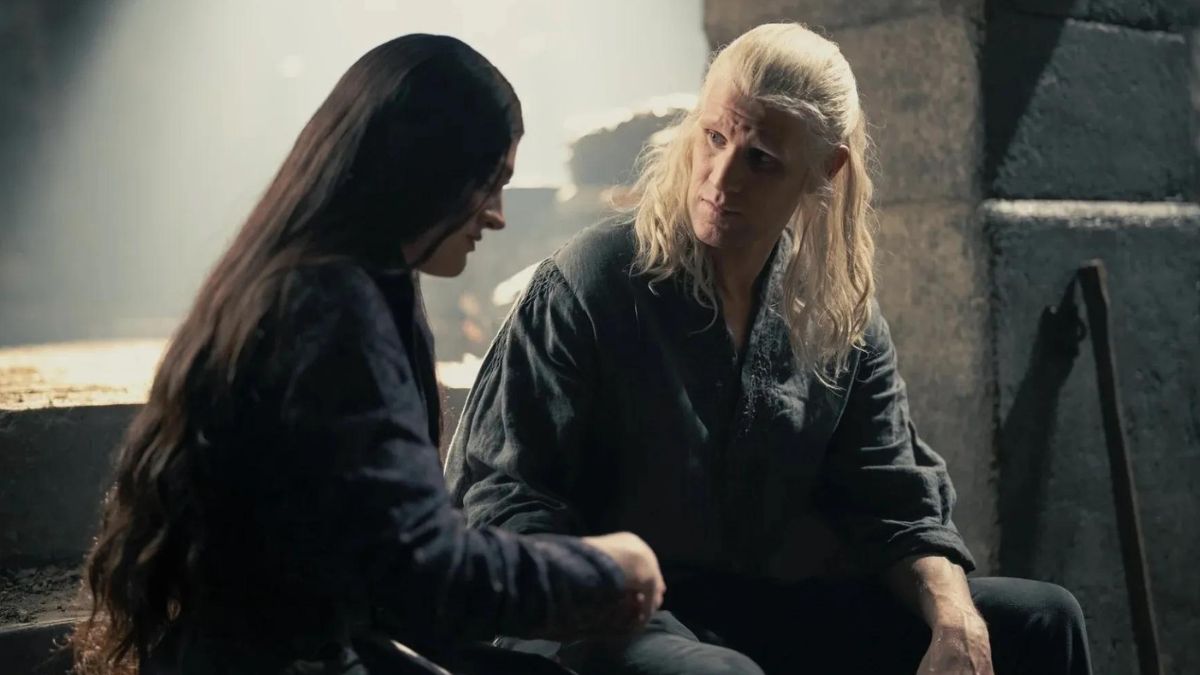Did Daemon Really Need All That Therapy at Harrenhal?
There has to be more to it, right?

House of The Dragon season 2 is wrapped, and now the fandom civil war begins over whether this season was good or bad. One of the most criticized arcs of this season was Daemon Targaryen at Harrenhal going through almost five episodes worth of therapy, thanks to Alys Rivers.
We have we have some strong mixed feelings about this. And even now, when the season finale has revealed what it has all been amounting to—the prophecy that gives him a renewed sense of purpose—it does feel a bit of an overkill to make him go through those haunting dreams for a better part of the season.
At first, Daemon’s inactivity broke the sense of urgency that you’d expect from a story that’s on the brink of war. But the more episodes went by, the clearer it became that we weren’t getting the actual war this season, only more prep. And hey, I’m not one to dismiss solid character-building. In fact, the nuances of Daemon’s self-realization are not lost on me, nor is the brilliant performance by Matt Smith. It adds a whole new dimension to what the people behind House of the Dragon said about his casting—Daemon could only ever have been played by him.
But then, there’s that niggling feeling in the back of my head that just wouldn’t go away. It wondered, did Daemon Targaryen really need to go through all that therapy at Harrenhal? Was he really not ready to “see” his part in the story right away?
The arc would have us believe that beneath all that, Daemon still wanted the crown, because of the main character energy that he wears, and quite well, like armor. But think back to HOTD season 1 to the scene where Daemon and Viserys are having an argument and Daemon’s true gripe with his brother spills out. It’s not the crown he wants, but his presence in his brother’s life. A brother who would rather trust his Hand, Otto Hightower, than his own blood. Daemon was willing to simply be by Viserys’ side and help him rule; only, they kept sending him away. And his ego retaliated by acting out.
Even when Ser Steffon Darklyn arrived at Dragonstone bearing the golden crown of Viserys, and Rhaenyra was crowned Queen, it was Daemon who placed the crown upon her brow. He had always defended her claim to the title, like slicing the head of Vaemond Velaryon who tried to cast a doubt on the legitimacy of her three eldest sons.
And when Rhaenyra lost their child, and soon after, her son Lucerys was killed, Daemon only sought to avenge his wife’s grief by demanding ‘A son for a son’, which was a rather era-appropriate act of vengeance. This is how men in those times would act, even royals. For Rhaenyra to see this as an act of Daemon not recognizing her authority as their ruler was a misinterpretation of his actions. He loved her, and in all those years, he never made any moves to usurp her claim, though he had plenty of opportunity to do so.
Which then begs the question again: Why did he have to receive this great therapy sesh with Dr. Alys Rivers at the Harrenhal clinic? Daemon was only as messed up as the rest of the characters. His motivations were never all that the dreams and visions led us to believe, of him thinking the crown was still owed to him and Rhaenyra was merely a tool to get power that should’ve been his. His incessant demand that he be addressed as the “King” and not “My prince” or “King consort” only began after those dreams made him believe that he was insecure about his position in the scheme of things.
The only tiny but ultimately immense beacon of hope that this brings me is that all those rumors about Daemon Targaryen surviving the Dance of The Dragons in the book Fire & Blood might amount to something in House of The Dragon, which has been deviated from its source material quite a bit. While Fire & Blood merely recounts versions of history and unidimensional characterizations of the people involved in the Targaryen civil war, HOTD is actually fleshing them out, lending gravitas to their actions and motivations, and weaving in the prophecy.
The fact that Daemon, despite not being a greenseer, has been given a peek into the future, implies that even if he is merely a part of this great story, his part is of great consequence, probably greater than being the progenitor of the line that birthed the Three-Eyed Raven and Daenerys Targaryen. Maybe he does survive the war and goes incognito as an agent in the war against the Others and the coming of Winter. He says the very words “Winter is coming,” in the season finale, and that has got to mean something more, right?
Showrunner Ryan Condal, in a post-finale interview, has said that Daemon doesn’t see Daenerys in his vision as we do; he doesn’t know who she is like we do. He could just as easily think that this girl is his and Rhaenyra’s daughter. And then, how would that shape his actions over the course of season 3, which is most likely going to end with the Battle Above the God’s Eye.
If House of The Dragon can give us a whole new facet to Daemon Targaryen’s book arc, then this whole Harrenhal inner journey would feel worth it. Otherwise, it just feels like they did this for the plot and vibes.
Have a tip we should know? tips@themarysue.com